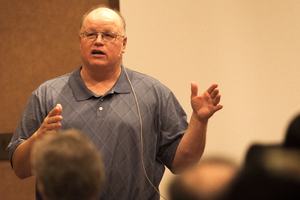Soil health expert speaks on campus

Gabe Brown, noted soil health advocate, spoke to about 75 area ag producers and 35 students at Chadron State College last month.
Ron Bolze, coordinator of the Nebraska Grazing Lands Coalition and Chadron State College lecturer, said the coalition and University of Nebraska–Lincoln Extension co-sponsored a traveling road show featuring Brown at eight locations statewide with a total attendance of approximately 650.
Brown focused on his holistic perspective of regenerating the land. With his wife and son, Brown owns and operates a diversified farm and ranch near Bismarck, N.D. His operation consists of a no-till cropping system with multi-species cover crops and all natural grass fed livestock.
Bolze said, “The concepts presented by Gabe Brown represent the future of farming in the U.S., particularly for the next generation of farmers that are going to have to farm with less expensive inputs and with less use and abuse of natural resources such as water.”
Although Brown presented how he increased profits while regenerating resources, he told participants, “It’s up to you how you operate your farm or ranch.”
Improving soil heath will improve the health of plants and livestock and therefore produce high quality ag products for people.
After purchasing his ranch from his in-laws, Brown realized the operation had poor fertility, weeds, pest, disease, erosion, poor infiltration, and lack of moisture.
“I had to learn to work with nature,” he said. He began a no-till cropping system and planted cover crops and then he grazed cattle using the cover crops to supplement the livestock which in return optimize the soil biology by depositing manure.
“We need diversity in agriculture, it simply works,” said Brown. Brown suggested growing six to seven native species or ones that will adapt to the area.
“Brown's concepts of rebuilding soil health through mob grazing cocktail mixes of cover crops on no-till, dry land acres rebuilds the soil organic matter to pre-tillage levels which can result in tremendous water holding capacity, elimination of commercial fertilizer, elimination of most herbicides, and increasing crop yields,” said Bolze.
Multi species cover crops will allow the soil to have adequate nutrition for plants. “Cover crops are a wonderful tool we can use,” said Brown.
“His farming practices have the potential to increase crop yields while simultaneously rebuilding soil health,” said Bolze.
Category: Campus News, Physical and Life Sciences, Range Management

